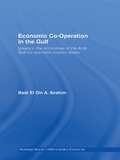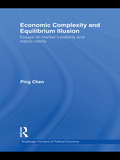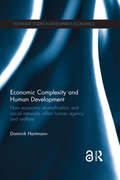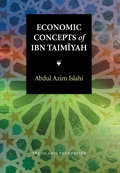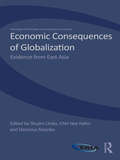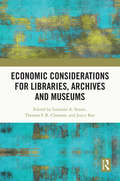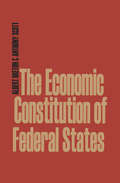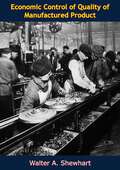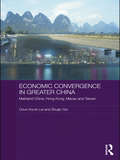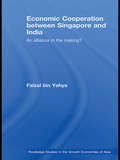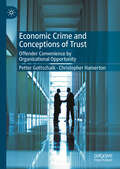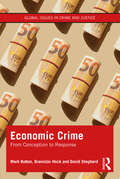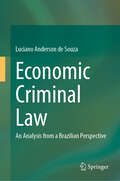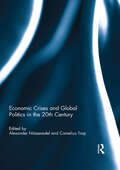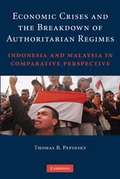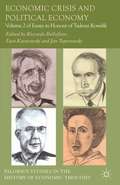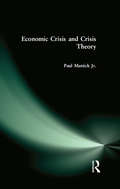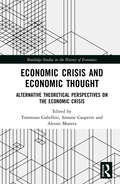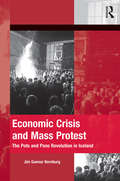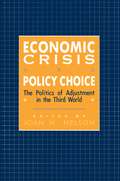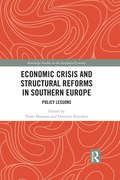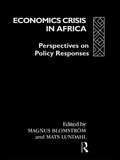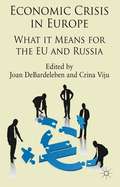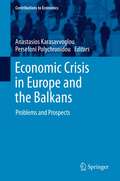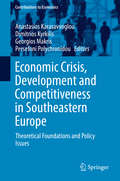- Table View
- List View
Economic Co-Operation in the Gulf: Issues in the Economies of the Arab Gulf Co-Operation Council States (Routledge Studies in Middle Eastern Economies)
by Badr El IbrahimWith global concerns over rising oil prices, this book examines the major issues facing the economies of the Arab Gulf today, covering all six of the Arab Gulf Cooperation Council (AGCC) states: Bahrain, Kuwait, Oman, Qatar, Saudi Arabia and the United Arab Emirates. Providing a detailed account of the central features of the economies of the Arab Gulf, this book draws out the critical trends that will shape the region in future years. It includes an in-depth analysis of topical issues such as the AGCC monetary union, intra-AGCC national labour movement, Islamic banking and programmes to finance small and medium-sized enterprises (SMEs). The book: assesses the costs and benefits of the proposed monetary union, assessing whether AGCC economic structures have converged sufficiently, and whether these economies have the internal flexibility necessary to make the union work effectively investigates intra-national labour mobility in the context of the forthcoming monetary union and identifies the most crucial features in a successful common AGCC employment strategy considers the fortunes of the prominent Islamic banks in the region examines the impact on liquidity of the external economic environment and regulatory policy contrasts and compares some of the major SME financing schemes, focusing in particular on SME financing in Oman.
Economic Complexity and Equilibrium Illusion: Essays on Market Instability and Macro Vitality (Routledge Frontiers Of Political Economy Ser. #130)
by Ping ChenThe Principle of Large Numbers indicates that macro fluctuations have weak microfoundations; persistent business cycles and interrupted technologies can be better characterized by macro vitality and meso foundations. Economic growth is limited by market extent and ecological constraints. The trade-off between stability and complexity is the foundation of cultural diversity and mixed economies. The new science of complexity sheds light on the sources of economic instability and complexity. This book consists of the major work of Professor Ping Chen, a pioneer in studying economic chaos and economic complexity. They are selected from works completed since 1987, including original research on the evolutionary dynamics of the division of labour, empirical and theoretical studies of economic chaos and stochastic models of collective behavior. Offering a new perspective on market instability and the changing world order, the basic pillars in equilibrium economics are challenged by solid evidence of economic complexity and time asymmetry, including Friedman’s theory of exogenous money and efficient market, the Frisch model of noise-driven cycles, the Lucas model of microfoundations and rational expectations, the Black-Scholes model of option pricing, and the Coase theory of transaction costs. Throughout, a general theory based on complex evolutionary economics is developed, which integrates different insights from Marx, Marshall, Schumpeter, Keynes and offers a new understanding of the evolutionary history of division of labour. This book will be of interest to postgraduates and researchers in Economics, including macroeconomics, financial economics, advanced econometrics and economic methodology.
Economic Complexity and Human Development: How Economic Diversification and Social Networks Affect Human Agency and Welfare (Routledge Studies in Development Economics #110)
by Dominik HartmannThis book combines the human development approach and innovation economics in order to explore the effects that structural economic change has on human development. While economic diversification can provide valuable new social choices and capabilities, it also tends to lead to more complex decision processes and changes to the set of capabilities required by people to self-determine their future. Within this process of structural transformation, social networks are crucial for accessing information and social support, but networks can also be a root cause of exclusion and inequality reproduction. This implies the need to encourage innovation and economic diversification beyond production expansion, focusing on the promotion of human agency and social inclusion. This book provides such a modern perspective on development economics, emphasizing the role of social networks, economic diversity and entrepreneurship for social welfare. The author discusses how innovation, social networks, economic dynamics and human development are interlinked, and provides several practical examples of social and micro-entrepreneurship in contexts as diverse as Peruvian rural villages and Brazil’s urban areas. The interdisciplinary perspective put forward in this book illustrates theoretical and methodological methods of exploring the complexity of development in a practical and relevant way. It also provides useful information about structural factors which need to be considered by practitioners when designing pro-poor growth policies. Furthermore, the coverage of the core concepts of innovation, networks and development economics, enriched with multiple examples, makes it a valuable resource for scholars and advanced students of modern development economics.
Economic Concepts of Ibn Taimiyah
by Abdul Azim IslahiThis valuable work presents Ibn Taimiyah's thoughts on the concept of Islamic economics, the state in the economy, on public finance, money, interest, prices, partnership, and profit-sharing, and offers a comparison of his ideas with those of some medieval scholars in Europe, along with a study of his influence on Islamic thinkers in later periods.
Economic Consequences of Globalization: Evidence from East Asia (Routledge-eria Studies In Development Economics Ser.)
by Shujiro Urata Dionisius Narjoko Chin Hee HahnEconomists have long recognized the gains from international trade. The question is, does international trade – or more broadly, globalization – increase growth? Notwithstanding the debates, there are still many questions, old and new, need to be explored in order to improve our understanding on various aspects of globalization, including its consequences. This book addresses some of these questions, utilizing micro datasets of some East Asian countries. The focus on East Asia is particularly interesting for the reason that most of these countries have relatively more opened economy and experienced a rapid de facto integration quite recently. The book puts forward questions which are related to the relationship between globalization on the one hand, and firm performance, activities, or characteristics, on the other. The chapters draw recent theoretical framework from the relevant literatures, and then empirically test – mostly by econometric analysis – the hypotheses on these relationships. The extent or magnitude of the globalization impact is also demonstrated by the means of descriptive analysis. Finally, there are useful insights for policy decision-makers to be drawn from the empirical results. The book presents rigorous empirical analysis based on recent theoretical framework in international economics, focusing on the highest growing region in the world. The use of micro-data analysis – a key feature of this book – gives us much richer information on various issues of globalization. This book, therefore, should be of the interest to scholars and postgraduate students of international economics, development economics, and East Asian economics.
Economic Considerations for Libraries, Archives and Museums
by Lorraine A. Stuart Thomas F. R. Clareson Joyce RayEconomic Considerations for Libraries, Archives and Museums provides insight into the economics of collaboration across Libraries, Archives, and Museums (LAMs) and cultural heritage funding. Drawing together a series of global reflections on the past, present and future of cross-sector approaches to preserving and promoting cultural heritage, this volume examines the economic prospects of LAMs from a variety of facets. Divided into five sections, the book covers the five most important areas in the development and sustainability of collaborative LAM projects: the digital environment; collaborative models; education; funding issues; and alternate sources of funding. Responding directly to the issue of a lack of adequate funding for maintaining and providing access to cultural heritage resources globally, the book argues that cultural heritage institutions must seek creative methods for funding and collaboration at all levels to achieve shared goals. Economic Considerations for Libraries, Archives and Museums will be of interest to all those engaged in the study of library and information science, archival studies, museum studies and digital preservation. Administrators and practitioners will also find much to interest them within the pages of the book.
Economic Constitution of Federal States
by Anthony Scott Albert BretonA study of "economic imperialism" based on a theoretical inquiry into the most important research frontier in the scholarly field: the analysis of constitutions. The book evaluates constitutional arrangements by the degree to which they economize on the scarcity of resources available in any society, demonstrating a preference for constitutions that make governments efficient.
Economic Control of Quality of Manufactured Product
by Walter A. ShewhartThe father of modern quality control, Walter A. Shewhart brought together the disciplines of statistics, engineering, and economics in a simple but highly effective tool: the control chart. This technique, and the principles behind it, has played a key role in economic development from the 1940's through to the present day. Most of Shewhart's professional career was spent at Western Electric as an engineer from 1918 to 1924 and at Bell Telephone Laboratories from 1925 until his retirement in 1956. In addition, he served for more than 20 years as the first editor of the Mathematical Statistics Series published by John Wiley & Sons.-ASQ
Economic Convergence in Greater China: Mainland China, Hong Kong, Macau and Taiwan (Routledge Studies on the Chinese Economy)
by Shujie Yao Chun Kwok LeiAlthough China's economy has grown very rapidly in recent decades, there are still very large differences between the economy of mainland China and the economies of Hong Kong, Macau and Taiwan. For example, per capita income in Hong Kong is many, many times higher than per capita income in mainland China. This book considers the degree to which economic convergence between mainland China, Hong Kong, Macau and Taiwan has occurred, and the prospects for increased convergence in the future. It considers economic integration between China and its two Special Administrative Regions (SARS), emphasising the large volume of capital flows and exports, especially from Hong Kong into China, and showing that the economies are highly integrated, despites their differences. It examines income convergence, and changes in productivity, using the same measures for both China and the two SARS, unlike most existing studies. It explores how economic reforms have been crucial to increasing convergence so far, and will continue to be in the future, and concludes by discussing the implications for policy of encouraging increased convergence.
Economic Cooperation between Singapore and India: An Alliance in the Making? (Routledge Studies In The Growth Economies Of Asia)
by Faizal bin YahyaAsian interregional economic cooperation has assumed greater prominence with the rise of Asia‘s two giant economies of China and India. The economic liberalization of China‘s economy in 1979, followed by India in 1991, signalled the presence of business opportunities to foreign investors - including those from Asia. This book examines the growing e
Economic Crime and Conceptions of Trust: Offender Convenience by Organizational Opportunity
by Petter Gottschalk Christopher HamertonEconomic Crime and Conceptions of Trust explores the intricacies of the contemporary concept of trust in episodes of misconduct through an analysis of workplace deviance and crime. Grounded in detailed examinations of contemporary case studies and bolstered by original comparative fieldwork, the text takes an offender-focused approach, emphasizing the pivotal role of convenience. Adopting an interdisciplinary perspective, the authors seek to enhance and broaden existing understanding of white-collar and corporate criminology, while also highlighting its relevance to strategic management studies. A core argument of the book is that the traditional emphasis on individual actors and notions of trustworthiness when conceptualising white-collar has waned in recent times. The authors’ perspective revisits and builds upon this important foundational concept of late twentieth-century discourse within the discipline, signalling a need for a reassessment and highlighting a number of recent conceptual developments to evaluate and position trust within the twenty-first century globalized business sphere.
Economic Crime: From Conception to Response (Global Issues in Crime and Justice)
by Mark Button David Shepherd Branislav HockThis book is the first attempt to establish 'economic crime' as a new sub-discipline within criminology. Fraud, corruption, bribery, money laundering, price-fixing cartels and intellectual property crimes pursued typically for financial and professional gain, have devastating consequences for the prosperity of economic life. While most police forces in the UK and the USA have an ‘economic crime’ department, and many European bodies such as Europol use the term and develop strategies and structures to deal with it, it is yet to grain traction as a widely used term in the academic community. Economic Crime: From Conception to Response aims to change that and covers: definitions of the key premises of economic crime as the academic sub-discipline within criminology; an overview of the key research on each of the crimes associated with economic crime; public, private and global responses to economic crime across its different forms and sectors of the economy, both within the UK and globally. This book is an essential resource for students, academics and practitioners engaged with aspects of economic crime, as well as the related areas of financial crime, white-collar crime and crimes of the powerful.
Economic Criminal Law: An Analysis from a Brazilian Perspective
by Luciano Anderson SouzaThis book investigates the legitimacy of Economic Criminal Law. Initially, it examines the history of the intersection between criminal law and economy, aiming at finding a possible evolutionary trait. Then it defines what is meant by Economic Criminal Law, and whether it would be necessary and possible to subsume it to the protected interest theory. Subsequently it analyzes theories that intend to equate the administratisation of criminal law, highlighting the proposed administrative-punitive. Finally, the conclusion searches for the best legal construction of the rules for economic infractions, limiting the role of criminal law in this context. The imperiousness of effective protection of the economic environment seems undeniable today. The structure of post-industrial capitalist system reveals, paradoxically, features unwanted by the existing mode of production, which the contemporary sociology understands as the reflexivity of risk society. In this sense, the economic agents undertake conduct detrimental to the conformation of the economic society, undermining the smooth functioning of the economy itself. In this context, the law, especially the criminal law, is used to try to head them off. It happens that such employment of legal and judicial branch clashes with their traditional boundaries, delineated since the Enlightenment. Complex economic behavior are criminally prohibited, in most cases through typifying proactive formulations, which are inconsistent and display as mere means of behavioral conformation, subject to administrative jurisdiction, which leads to the administrativization of the criminal law.
Economic Crises and Global Politics in the 20th Century
by Cornelius Torp Alexander NützenadelThis book analyses the history of economic crises from the angle of international politics and its transformation throughout the 20th century. While political and economic debates in the wake of the present financial crisis are revolving around the question of how to create effective forms of global governance, historians have discovered a long tradition of international economic regulation that can be traced back to the late 19th century. In the global economy, sovereign defaults, banking crises and currency crashes have been recurrent phenomena. At the same time, alongside the growing globalization of commodity and capital markets, nation-states have introduced new forms of regulation both on the national and international level. The experience of economic crises has been an important driver behind numerous initiatives to foster global politics.The purpose of the book is to reconnect economic history with the perspectives of political economy and the history of international relations. It forms a dialogue between the disciplines that have been increasingly separated throughout the past decades. With first-rate economic historians and political economists writing for a wider audience, it simultaneously makes public debates and methods of recent cutting-edge research in economic history within a wider academic community. This book was originally published as a special issue of the European Review of History.
Economic Crises and the Breakdown of Authoritarian Regimes
by Thomas B. PepinskyWhy do some authoritarian regimes topple during financial crises, while others steer through financial crises relatively unscathed? In this book, Thomas B. Pepinsky uses the experiences of Indonesia and Malaysia and the analytical tools of open economy macroeconomics to answer this question. Focusing on the economic interests of authoritarian regimes' supporters, Pepinsky shows that differences in cross-border asset specificity produce dramatically different outcomes in regimes facing financial crises. When asset specificity divides supporters, as in Indonesia, they desire mutually incompatible adjustment policies, yielding incoherent adjustment policy followed by regime collapse. When coalitions are not divided by asset specificity, as in Malaysia, regimes adopt radical adjustment measures that enable them to survive financial crises. Combining rich qualitative evidence from Southeast Asia with cross-national time-series data and comparative case studies of Latin American autocracies, Pepinsky reveals the power of coalitions and capital mobility to explain how financial crises produce regime change.
Economic Crisis And Political Economy
by Riccardo Bellofiore Jan Toporowski Ewa KarwowskiRosa Luxemburg, Oskar Lange and Michal Kalecki made important contributions to twentieth century political economy that guided the thinking of their student Tadeusz Kowalik. The chapters of this volume examine how the ideas of Luxemburg, Lange, Kalecki and Kowalik can illuminate our understanding of the crisis in twenty-first century capitalism.
Economic Crisis and Crisis Theory
by Paul Mattick Jr.Keynesian economics claimed to have overcome the problem of economic depressions. However, as Mattick argues that crises are inherent within capitalism and that neither the market nor Keynesianism can stop "the steady deterioration of the economy". Written in 1974, Economic Crisis and Crisis Theory is one of Mattick's most valuable contributions to the Marxist critique of political economy and radical theory in general.
Economic Crisis and Economic Thought: Alternative Theoretical Perspectives on the Economic Crisis (Routledge Studies in the History of Economics)
by Tommaso Gabellini Simone Gasperin Alessio MonetaThe ongoing economic crisis has revealed fundamental problems both in our economic system and the discipline which analyses it. This book presents a series of contrasting but complementary approaches in economic theory in order to offer a critical toolkit for examining the modern capitalist economy. The global economic crisis may have changed the world in which we live, but not the fundamental tenets of the discipline. This book is a critical assessment of the relation between economic theory and economic crises: how intellectual thinking impacts on real economic events and vice versa. It aims at challenging the conventional way in which economics is taught in universities and later adopted by public officials in the policymaking process. The contributions, all written by distinguished academics and researchers, offer a heterodox perspective on economic thinking and analysis. Each chapter is inspired by alternative theoretical approaches which have been mostly side-lined from current academic teaching programmes. A major suggestion of the book is that the recent economic crisis can be better understood by recovering such theoretical analyses and turning them into a useful framework for economic policymaking. Economic Crisis and Economic Thought is intended as a companion to economics students at the Master’s and PhD level, in order for them to confront issues related to the labour market, the financial sector, macroeconomics, industrial economics, etc. with an alternative and complementary perspective. It challenges the way in which economic theory is currently taught and offered via alternatives for the future.
Economic Crisis and Mass Protest: The Pots and Pans Revolution in Iceland (The Mobilization Series on Social Movements, Protest, and Culture)
by Jon Gunnar BernburgAlthough the triggering effect of economic crises on revolt is a classic sociological topic, crises have until recently mostly triggered large-scale collective action in developing countries. The antigovernment protests that occurred in several European countries in the aftermath of the global financial crisis brought crises to the forefront of collective action research in democratic societies, as well as provide important opportunities for studying how crises can trigger large-scale collective action. This volume focusses on Iceland’s ’Pots and Pans Revolution’, a series of large scale antigovernment protests and riots that took place in Iceland in autumn 2008 and January 2009. The Icelandic case offers a rare opportunity to study processes that can trigger political protest in an affluent, democratic society. The protests took place in the aftermath of a national financial collapse triggered by the global financial crisis in early October 2008. While having almost no tradition of mass protest, Iceland was among the first countries to respond to the global crisis with large-scale protest. The level of public mobilization was exceptionally high (about 25 percent participation rate) and the protests did not stop until they had brought down the ruling government of Iceland. Using qualitative and quantitative data, this volume situates the protest in historical-cultural context and applies social movement theory to explore how the economic crisis ended up triggering the protests, thus providing a step toward understanding why the global financial crisis has triggered public unrest in other countries.
Economic Crisis and Policy Choice: The Politics of Adjustment in the Third World
by Joan M. NelsonThe acute economic pressures of the 1980s have forced virtually all of Latin America and Africa and some countries in Asia into painful austerity programs and difficult economic reforms. Scholars have intensively analyzed the economics of this situation, but they have given much less attention to the political forces involved. In this volume a number of eminent contributors analyze the politics of adjustment in thirteen countries and nineteen governments, drawing comparisons not only across the full set of cases but also within clusters selected to clarify specific issues. Why do some governments respond promptly to signs of economic trouble, while others muddle indecisively for years? Why do some confine their response to temporary macroeconomic measures, while others adopt broader, even sweeping, programs of reform? What leads some countries to experiment with heterodox approaches, while most, however reluctantly, pursue orthodox courses? Why, confronted with intense political protest, have some governments persisted while others have altered or abandoned course? The answers to these questions are political, not economic, and they are examined here by Thomas M. Callaghy, Stephan Haggard, Miles Kahler, Robert R. Kauman, Joan M. Nelson, and Barbara Stallings.
Economic Crisis and Structural Reforms in Southern Europe: Policy Lessons (Routledge Studies in the European Economy)
by Paolo Manasse Dimitris KatsikasIn recent years the countries of southern Europe have undergone, with varying intensity, a serious and prolonged economic crisis. Most have had to implement comprehensive economic adjustment programmes, including a wide range of structural reforms. Economic Crisis and Structural Reforms in Southern Europe examines these reforms, drawing policy lessons from their successes and failures. This book employs two basic strands of analysis: issues of policy design, and political economy considerations. It considers the choice of timing and sequencing of reforms, the choice of the appropriate policy instruments, the pressure of interest groups and the political calculations involved in reforms. Featuring chapters in which contributors explore both national cases of specific structural reforms, and a comparative approach in order to evaluate similar reforms across countries, this important and topical work explores ongoing issues within the economy. Focusing on the challenges of designing and implementing structural reforms under conditions of crisis, this book will be of interest to policy makers and researchers from national and international organizations as well as academics and members of research institutes interested in the economics and politics of the Eurozone crisis.
Economic Crisis in Africa: Perspectives on Policy Responses
by Mats Lundahl Magnus BlomströmWhile the pitiful images of famine victims generally emanate from the very poorest countries in Sub-Saharan Africa, the entire region faces an intense economic crisis. Why is this area in a state of near-permanent crisis and perhaps more importantly, what can be done about it? In Economic Crisis in Africa the authors use country studies to examine how this situation has come about. The book is divided into four parts: Part I presents an overall perspective of the African Crisis and its management; Part II addresses the problems of the external sector; Part III discusses the crises and structural adjustment from a microperspective; and finally, Part IV examines changes in economic systems which took place during the 1980s. At a time when famine again threatens the area, this work offers a valuable insight into a highly complex and critical situation.
Economic Crisis in Europe
by Joan Debardeleben Crina VijuThe financial crisis of 2008-09 took an unexpected turn upon challenging a core symbol of Europe's integration project, the Euro. In this volume, leading experts tackle questions on the capacity of the EU to respond, the manner discontent electorates will hold their leaders to account, and the implications for Europe's future relations with Russia.
Economic Crisis in Europe and the Balkans: Problems and Prospects
by Anastasios Karasavvoglou Persefoni PolychronidouThe economies of the European countries are still in recession, the development process is at a standstill, companies are facing financial difficulties, and the EU's monetary policy is tight and focused on lowering inflation. The fiscal problems and high debt levels of the northern European countries are of great importance, and they are the consequences of both the European economy's structural characteristics and the EU's policies. The economic area of Eastern Europe, the Balkans and the Black Sea countries is also vital, due to its special economic characteristics. The effects of the economic crisis on this particular area are catalytic, while the prospects for recovery are doubtful. The present book deals with the key aspects of the economic crisis in Europe, especially focusing on southeast Europe and the Balkans. The consequences of the crisis in these countries are analyzed and suggestions for how to address the crisis are outlined.
Economic Crisis, Development and Competitiveness in Southeastern Europe
by Anastasios Karasavvoglou Persefoni Polychronidou Dimitrios Kyrkilis Georgios MakrisThis book analyzes the foundations and means of overcoming the current crisis in the broader area of Southeast Europe. The contributions make proposals from both theoretical and empirical points of view and discuss the concept, determinants and policies of competitiveness in these countries. The financial crisis became a prolonged fiscal crisis, a bank confidence crisis, and economic recession, and the book discusses the European and national policies implemented to resolve it. It also investigates the internal conflicts generated by institutional arrangements and policy measures, both within the nation states and the eurozone. Economic competitiveness is a key topic for policymakers, as they have to secure economic growth and improve their populations' standards of living. This volume sheds light on what constitutes economic competitiveness, as well as on the policies and economic and institutional structures that improve competitiveness.
